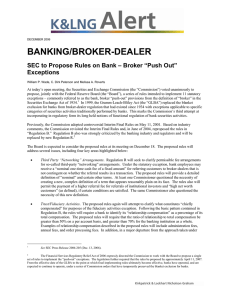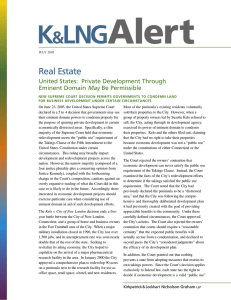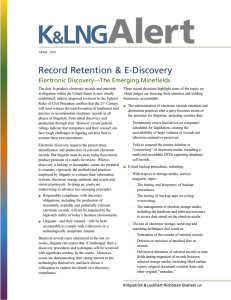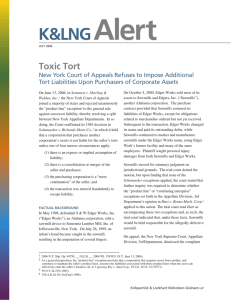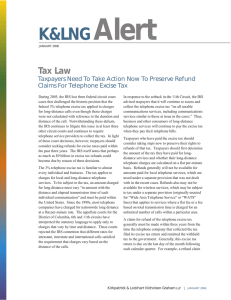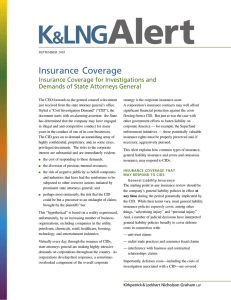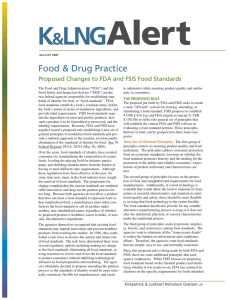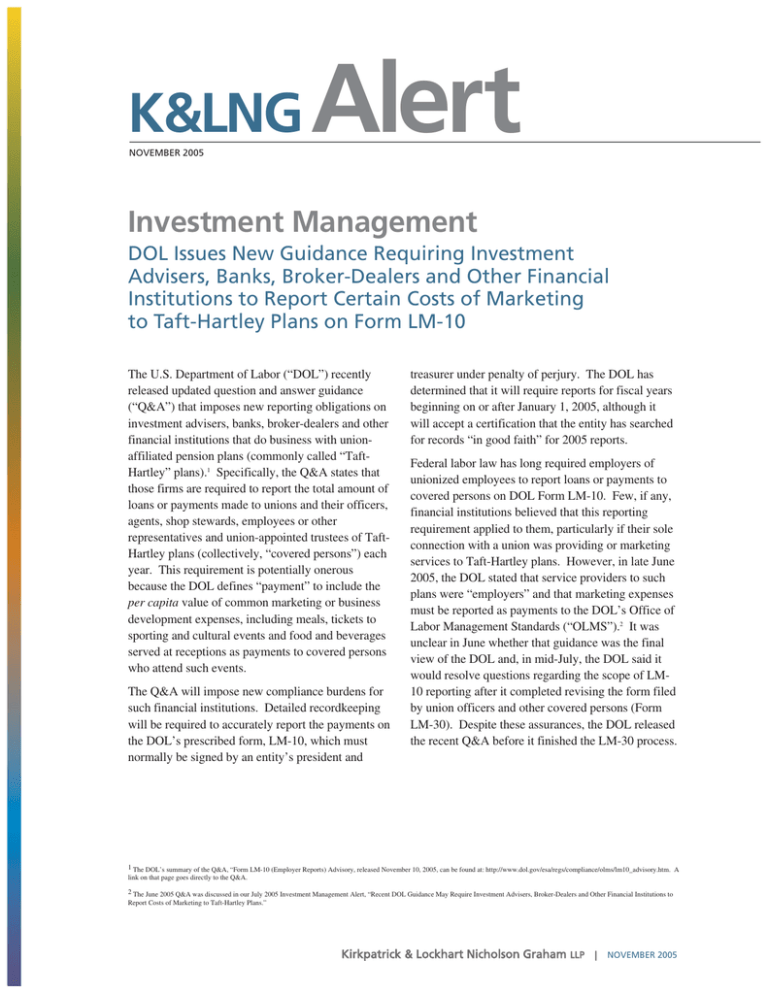
K&LNG
NOVEMBER 2005
Alert
Investment Management
DOL Issues New Guidance Requiring Investment
Advisers, Banks, Broker-Dealers and Other Financial
Institutions to Report Certain Costs of Marketing
to Taft-Hartley Plans on Form LM-10
The U.S. Department of Labor (“DOL”) recently
released updated question and answer guidance
(“Q&A”) that imposes new reporting obligations on
investment advisers, banks, broker-dealers and other
financial institutions that do business with unionaffiliated pension plans (commonly called “TaftHartley” plans).1 Specifically, the Q&A states that
those firms are required to report the total amount of
loans or payments made to unions and their officers,
agents, shop stewards, employees or other
representatives and union-appointed trustees of TaftHartley plans (collectively, “covered persons”) each
year. This requirement is potentially onerous
because the DOL defines “payment” to include the
per capita value of common marketing or business
development expenses, including meals, tickets to
sporting and cultural events and food and beverages
served at receptions as payments to covered persons
who attend such events.
The Q&A will impose new compliance burdens for
such financial institutions. Detailed recordkeeping
will be required to accurately report the payments on
the DOL’s prescribed form, LM-10, which must
normally be signed by an entity’s president and
treasurer under penalty of perjury. The DOL has
determined that it will require reports for fiscal years
beginning on or after January 1, 2005, although it
will accept a certification that the entity has searched
for records “in good faith” for 2005 reports.
Federal labor law has long required employers of
unionized employees to report loans or payments to
covered persons on DOL Form LM-10. Few, if any,
financial institutions believed that this reporting
requirement applied to them, particularly if their sole
connection with a union was providing or marketing
services to Taft-Hartley plans. However, in late June
2005, the DOL stated that service providers to such
plans were “employers” and that marketing expenses
must be reported as payments to the DOL’s Office of
Labor Management Standards (“OLMS”).2 It was
unclear in June whether that guidance was the final
view of the DOL and, in mid-July, the DOL said it
would resolve questions regarding the scope of LM10 reporting after it completed revising the form filed
by union officers and other covered persons (Form
LM-30). Despite these assurances, the DOL released
the recent Q&A before it finished the LM-30 process.
1 The DOL’s summary of the Q&A, “Form LM-10 (Employer Reports) Advisory, released November 10, 2005, can be found at: http://www.dol.gov/esa/regs/compliance/olms/lm10_advisory.htm. A
link on that page goes directly to the Q&A.
2 The June 2005 Q&A was discussed in our July 2005 Investment Management Alert, “Recent DOL Guidance May Require Investment Advisers, Broker-Dealers and Other Financial Institutions to
Report Costs of Marketing to Taft-Hartley Plans.”
Kirkpatrick & Lockhart Nicholson Graham LLP |
NOVEMBER 2005
The new Q&A reiterates the DOL’s view that
financial service providers to Taft-Hartley plans must
report all payments, including meals and other
routine marketing expenses, made to covered
persons. Although the Q&A adopts a $250 de
minimis exception, this is an aggregate amount. The
DOL expects financial institutions to track all
payments to covered persons and report payments to
covered persons that, aggregated over the course of
the year, exceed $250. Although there are certain
statutory reporting exemptions, including exemptions
for banks and insurance companies, the DOL’s view
is that these exemptions do not apply to marketing
expenses.
The Q&A is discussed in greater detail below. The
DOL has promised to issue additional guidance that
will illustrate how the LM-10 filing requirement
applies in specific contexts. The DOL has also
encouraged employers to comment on the proposed
changes to Form LM-30.
BACKGROUND: DOL TOUGHENS UNION
REPORTING REQUIREMENTS
OLMS enforces the Labor Management Reporting
and Disclosure Act (“LMRDA”), a 1959 law
designed to promote union democracy and
transparency and deter union-related corruption. The
LMRDA requires unions and union officials to file
certain financial reports. Employers must report
payments to covered persons, but the law does not
clearly require businesses to report payments when
they have no relationship with a union but only
provide services (or seek to provide services) to a
Taft-Hartley plan. Because the LMRDA is focused
on union governance, OLMS generally has limited
dealings with financial institutions and,
understandably, a limited understanding of their
marketing practices, compliance systems, and
oversight by other regulatory agencies.
In early 2001, OLMS began to aggressively interpret
the LMRDA. A recent decision by the U.S. Court of
Appeals for the D.C. Circuit upheld DOL regulations
requiring new and highly detailed reports from
unions but struck down new reports the DOL tried to
require from union-related trusts. AFL-CIO v. Chao,
No. 04-5057 (D.C. Cir. May 31, 2005). The DOL’s
arguments in that case make clear that the DOL
2
views the reports required by the LMRDA as tools to
inform union members of how unions are managed
and how union officials are compensated. OLMS
recently issued proposed rules that would
significantly tighten reporting by union officers and
other covered persons. OLMS views employer
reports as a way to encourage accurate reporting from
union officials.
KEY POINTS OF THE NEW Q&A
Despite concerns expressed by many trade
associations representing the financial services
industry, the recent Q&A adopts many of the views
the DOL announced in June. The Q&A is troubling,
because it imposes new compliance burdens without
any analysis of the cost of those burdens or whether
the reports sought are justified or even required by
law. Key points of the Q&A include the following:
■
Expansive Definitions of “Employer” and
Reportable Payments
The Q&A adopts the broad definition of
“employer” that the DOL announced in June.
According to the Q&A, “employer” means
every business that has employees, i.e.,
virtually all businesses. The Q&A also makes
clear that employers are required to report gifts
to covered persons even if there is no
relationship between the employer and a union.
Although the Q&A purports to limit the filing
requirement to certain classes of employers, the
Q&A clearly states that employers that do
business with or seek to do business with TaftHartley plans are required to report. Failure to
file a required report is a civil violation and, if
the failure is “willful,” a crime.
Reportable payments include many items that
are routinely offered to clients and prospective
clients. The Q&A specifically lists marketing
expenses, including meals, receptions and
dinners, golf outings, tickets to baseball games
and invitations to holiday parties, as reportable
payments. Directors’ fees paid to union
officials who are corporate directors are also
reportable. Payments to charities at the request
of a union do not appear to be reportable,
although such payments may raise other
legal issues.
Kirkpatrick & Lockhart Nicholson Graham
LLP
|
NOVEMBER 2005
■
The LMRDA specifically exempts from
reporting any payments and loans made by
banks, credit unions, insurance companies and
other “credit institutions.” Despite this clear
language, the DOL believes that only payments
and loans that reflect the regular course of
business and that are arm’s-length, commercial
transactions made without regard to the
recipient’s status as a union official are exempt
from reporting. The DOL relies on a 1960
DOL release that adopted the first Form LM-10
and that included this limitation. Marketing
payments are not, in the DOL’s view, made in
the regular course of business, even if they are
deductible for federal income tax purposes. In
the DOL’s view, business development,
marketing and other similar expenses are
merely incidental to the regular course of
business and, therefore, must be reported when
they involve a “payment” to a covered person.
■
Annual Aggregate De Minimis Requires
Constant Tracking of all Payments
Form LM-10 permits filers to exclude reports
of “sporadic or occasional gifts, gratuities, or
favors of insubstantial value, given under
circumstances and terms unrelated to the
recipients’ status in a labor organization.” The
Q&A states that gifts and gratuities with an
aggregate annual value of $250 per recipient or
less provided by an employer will be
considered insubstantial. The DOL initially
proposed a $25 de minimis, which was widely
decried as unreasonably low.
Although $250 is, obviously, more than $25,
the aggregate nature of the Q&A’s de minimis
threshold may make it more burdensome. For
example, in the eyes of the DOL, an investment
adviser who takes a union-appointed trustee of
a client fund to a $50 dinner five times a year
and, on one other occasion, reimburses that
trustee for a $10 parking expense has made a
$260 aggregate annual payment to the trustee
that must be reported. Thus, service providers
that rely on the de minimis exception will have
3
to track all payments to every covered person
during the course of a year in order to
determine whether a report is required.
Restrictive Interpretation of
Statutory Exemptions
■
Responsibility to Report Payments
made by Others
Service providers must report payments made
by others. If two employers share an expense
(e.g., a joint dinner or a reception), both
employers must report a share of the payment
to covered persons who attend the dinner or
the reception. However, in certain cases such
as a reception, an employer may not know
whether or to what extent attendees are
covered persons. The DOL seems to anticipate
that detailed attendance records will be kept in
such situations. In some circumstances,
service providers are required to report
payments made by their employees, even if the
service provider does not reimburse the
employee.
■
No Opportunity for Formal Comment;
Immediate Effect
Although the Q&A imposes new and complex
recordkeeping requirements, the DOL does not
believe that the Q&A represents any change in
the law or that it must give affected industries
formal notice of its views and an opportunity
to comment before the compliance
requirements of the Q&A become effective.
The Q&A states that service providers that
make reportable payments must file a Form
LM-10 for each year beginning on or after
January 1, 2005. The DOL will not require
reports for prior years absent “extraordinary
circumstances.” Reports must be filed 90 days
after the end of a filer’s fiscal year, which
would be by March 30, 2006 for businesses
with a calendar fiscal year.
CONCLUSION
The Q&A represents a sweeping expansion of how
the employer reporting requirement has been
interpreted and applied. Although the DOL has had
numerous meetings with affected sectors of the
business community, it has adopted a burdensome
and arguably draconian view of the LMRDA’s
Kirkpatrick & Lockhart Nicholson Graham
LLP
|
NOVEMBER 2005
employer reporting requirements. Absent a court
injunction or a DOL revision of its views, firms that
do or seek to do business with unions or Taft-Hartley
plans will have to evaluate their marketing programs
and expenses and determine how to track and report
marketing expenses consistent with the Q&A.
If you have any current or prospective clients that
are Taft-Hartley plans or unions, we encourage you
to be aware of the issues raised by the Q&A and, as
appropriate, discuss them with representatives of
4
your Taft-Hartley plan clients and your K&LNG
relationship attorney. We will keep you apprised of
developments regarding this issue.
Catherine S. Bardsley
202-778-9289
cbardsley@klng.com
William A. Schmidt
202-778-9373
william.schmidt@klng.com
David Pickle
202-778-9887
dpickle@klng.com
William P. Wade
310-552-5071
wwade@klng.com
Kirkpatrick & Lockhart Nicholson Graham
LLP
|
NOVEMBER 2005
If you have questions or would like more information about K&LNG’s Investment Management Practice, please contact
one of our lawyers listed below:
BOSTON
Michael S. Caccese
Mark P. Goshko
Thomas Hickey III
Nicholas S. Hodge
George Zornada
WASHINGTON
617.261.3133
617.261.3163
617.261.3208
617.261.3210
617.261.3231
mcaccese@klng.com
mgoshko@klng.com
thickey@klng.com
nhodge@klng.com
gzornada@klng.com
LONDON
Philip Morgan
+44.20.7360.8123 pmorgan@klng.com
LOS ANGELES
William P. Wade
310.552.5071 wwade@klng.com
NEW YORK
Robert J. Borzone, Jr. 212.536.4029
Jeffrey M. Cole
212.536.4823
Ricardo Hollingsworth 212.536.4859
Beth R. Kramer
212.536.4024
Richard D. Marshall
212.536.3941
Keith W. Miller
212.536.4045
Scott D. Newman
212.536.4054
rborzone@klng.com
jcole@klng.com
rhollingsworth@klng.com
bkramer@klng.com
rmarshall@klng.com
kmiller@klng.com
snewman@klng.com
SAN FRANCISCO
Eilleen M. Clavere
Jonathan D. Joseph
David Mishel
Timothy B. Parker
Mark D. Perlow
Richard M. Phillips
415.249.1047
415.249.1012
415.249.1015
415.249.1042
415.249.1070
415.249.1010
eclavere@klng.com
jjoseph@klng.com
dmishel@klng.com
tparker@klng.com
mperlow@klng.com
rphillips@klng.com
Clifford J. Alexander
Diane E. Ambler
Mark C. Amorosi
Catherine S. Bardsley
Arthur J. Brown
Arthur C. Delibert
Jennifer R. Gonzalez
Robert C. Hacker
Kathy Kresch Ingber
Michael J. King
Rebecca H. Laird
Deborah A. Linn
Cary J. Meer
R. Charles Miller
Dean E. Miller
Charles R. Mills
Jean E. Minarick
R. Darrell Mounts
C. Dirk Peterson
David Pickle
Alan C. Porter
Theodore L. Press
Francine J. Rosenberger
Robert H. Rosenblum
William A. Schmidt
Lori L. Schneider
Lynn A. Schweinfurth
Donald W. Smith
Martin D. Teckler
Robert A. Wittie
Robert J. Zutz
202.778.9068
202.778.9886
202.778.9351
202.778.9289
202.778.9046
202.778.9042
202.778.9286
202.778.9016
202.778.9015
202.778.9214
202.778.9038
202.778.9874
202.778.9107
202.778.9372
202.778.9371
202.778.9096
202.778.9029
202.778.9298
202.778.9324
202.778.9887
202.778.9186
202.778.9025
202.778.9187
202.778.9464
202.778.9373
202.778.9305
202.778.9876
202.778.9079
202.778.9890
202.778.9066
202.778.9059
calexander@klng.com
dambler@klng.com
mamorosi@klng.com
cbardsley@klng.com
abrown@klng.com
adelibert@klng.com
jgonzalez@klng.com
rhacker@klng.com
kingber@klng.com
mking@klng.com
rlaird@klng.com
dlinn@klng.com
cmeer@klng.com
cmiller@klng.com
dmiller@klng.com
cmills@klng.com
jminarick@klng.com
dmounts@klng.com
dpeterson@klng.com
dpickle@klng.com
aporter@klng.com
tpress@klng.com
francine.rosenberger@klng.com
rrosenblum@klng.com
william.schmidt@klng.com
lschneider@klng.com
lschweinfurth@klng.com
dsmith@klng.com
mteckler@klng.com
rwittie@klng.com
rzutz@klng.com
www.klng.com
BOSTON • DALLAS • HARRISBURG • LONDON • LOS ANGELES • MIAMI • NEWARK • NEW YORK • PALO ALTO • PITTSBURGH • SAN FRANCISCO • WASHINGTON
Kirkpatrick & Lockhart Nicholson Graham (K&LNG) has approximately 1,000 lawyers and represents entrepreneurs, growth and middle market companies, capital
markets participants, and leading FORTUNE 100 and FTSE 100 global corporations nationally and internationally.
K&LNG is a combination of two limited liability partnerships, each named Kirkpatrick & Lockhart Nicholson Graham LLP, one qualified in Delaware, U.S.A. and
practicing from offices in Boston, Dallas, Harrisburg, Los Angeles, Miami, Newark, New York, Palo Alto, Pittsburgh, San Francisco and Washington and one
incorporated in England practicing from the London office.
This publication/newsletter is for informational purposes and does not contain or convey legal advice. The information herein should not be used or relied upon in
regard to any particular facts or circumstances without first consulting a lawyer.
Data Protection Act 1988—We may contact you from time to time with information on Kirkpatrick & Lockhart Nicholson Graham LLP seminars and with our regular
newsletters, which may be of interest to you. We will not provide your details to any third parties. Please e-mail cgregory@klng.com if you would prefer not to
receive this information.
© 2005 KIRKPATRICK & LOCKHART NICHOLSON GRAHAM LLP. ALL RIGHTS RESERVED.



